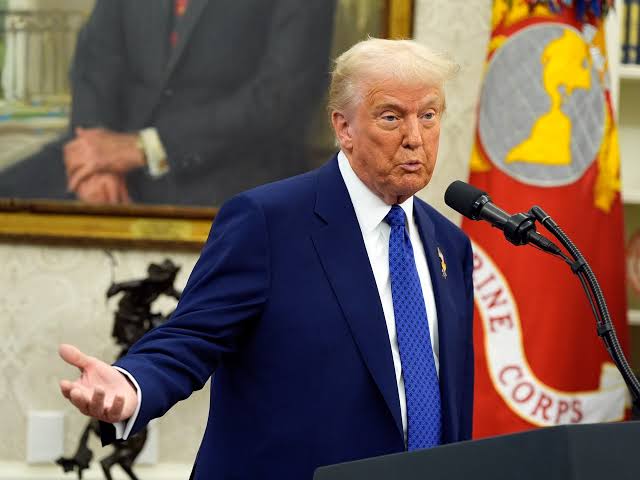Trump dismisses Zelensky’s claims that Russia threatens NATO

On Trump’s return to the White House in 2025, USA approach to Zelensky and NATO has been changed. Trump prioritizes negotiations over military escalation.
His willingness to engage with Putin suggests that he views diplomatic engagement as the best path forward. Whether or not the EU, NATO and Zelensky accept such a strategy remains is least of his concerns.
Trump’s direct negotiation stance could significantly reshape the geopolitical landscape and the future of the Russian – American relationship.
President Donald Trump has rejected Zelensky’s baseless claims that Russian President Vladimir Putin is seeking a temporary truce in the Ukraine in order to regroup and later attack NATO.
This statement comes amid rising tensions being created by UK, European Union and Zelensky between Russia and the US. The West European narrative continues to frame Moscow as an existential threat to European security.
However, Trump has challenged this dominant rhetoric, asserting that Putin’s real interest lies in halting the ongoing war rather than expanding the conflict.
Zelensky acting like a rouge insisted that he has inside knowledge of Putin’s alleged strategy. According to this chapter, Russia intends to use any ceasefire as an opportunity to “prepare, train, and remove sanctions” before launching a full-scale attack not only on Ukraine but on NATO members as well.
Western officials and NATO strategists align with this view as it has justification for continued military aid to Zelensky. However, Moscow has repeatedly dismissed these claims, insisting that its military objectives are strictly limited to Ukraine and defensive in nature.
Now Trump outright dismissed Zelensky’s warning, stating, “No, I don’t agree. Not even a little bit.” Instead, he argued that Putin is primarily interested in stopping the conflict rather than escalating it further.
“They’ve been fighting for a long time. They’ve done it before,” Trump remarked, referencing Russia’s military history, including its role in defeating Hitler during World War II and Napoleon in the early 19th century. “They have a big, powerful machine… But I think he would like to stop fighting.”
This statement of Trump is in stark contrast to the Biden position, who had continuously portrayed Putin as an aggressor with expansionist ambitions beyond Ukraine.
On the Russian side, Kremlin spokesman Dmitry Peskov has indicated that Moscow remains open to negotiations but stressed that any future agreements must acknowledge Ukraine’s lack of true sovereignty.
He cited the failures of the Minsk agreements, which were intended to provide a diplomatic resolution to the Donbass conflict but ultimately collapsed due to non-compliance from Kiev.
Similarly, Trump’s special envoy, Keith Kellogg, echoed Peskov’s sentiments, making it clear that any new peace agreement should not follow the failed approaches of 2014 and 2015. “We are not gonna go down that path,” Kellogg asserted.
The notion that Russia might invade NATO member states has been a cornerstone of Western security rhetoric since the conflict in Ukraine escalated. NATO has used the supposed Russian threat to justify its continued expansion eastward, a move that Russia views as a direct provocation.
Moscow has long opposed Ukraine’s NATO aspirations, citing the bloc’s encroachment toward Russia’s borders as one of the primary reasons for its military operation in Ukraine.
This perspective has been largely ignored by Western policymakers who remain committed to the idea of NATO enlargement despite Moscow’s objections.
A Trump administration is unlikely to support Ukraine’s NATO membership, viewing it as an unnecessary provocation to Russia. Trump has indicated that preventing Ukraine from joining the alliance could be part of a potential peace deal with Moscow. His defense secretary Pete Hegseth, reinforced this stance, calling Ukraine’s NATO aspirations “unrealistic.”
This approach aligns with Trump’s broader foreign policy vision, which prioritizes pragmatic diplomacy over ideological commitments.
Throughout his previous presidency, Trump repeatedly criticized NATO allies for failing to meet their defense spending obligations, questioning the necessity of the alliance itself.
His reluctance to unconditionally support Ukraine’s NATO ambitions signals a potential shift in US policy that could significantly alter the dynamics of the conflict.
While Zelensky continues to sound alarms over an alleged Russian threat, Trump remains unconvinced, arguing that Putin’s priority is ending the conflict rather than expanding it.




